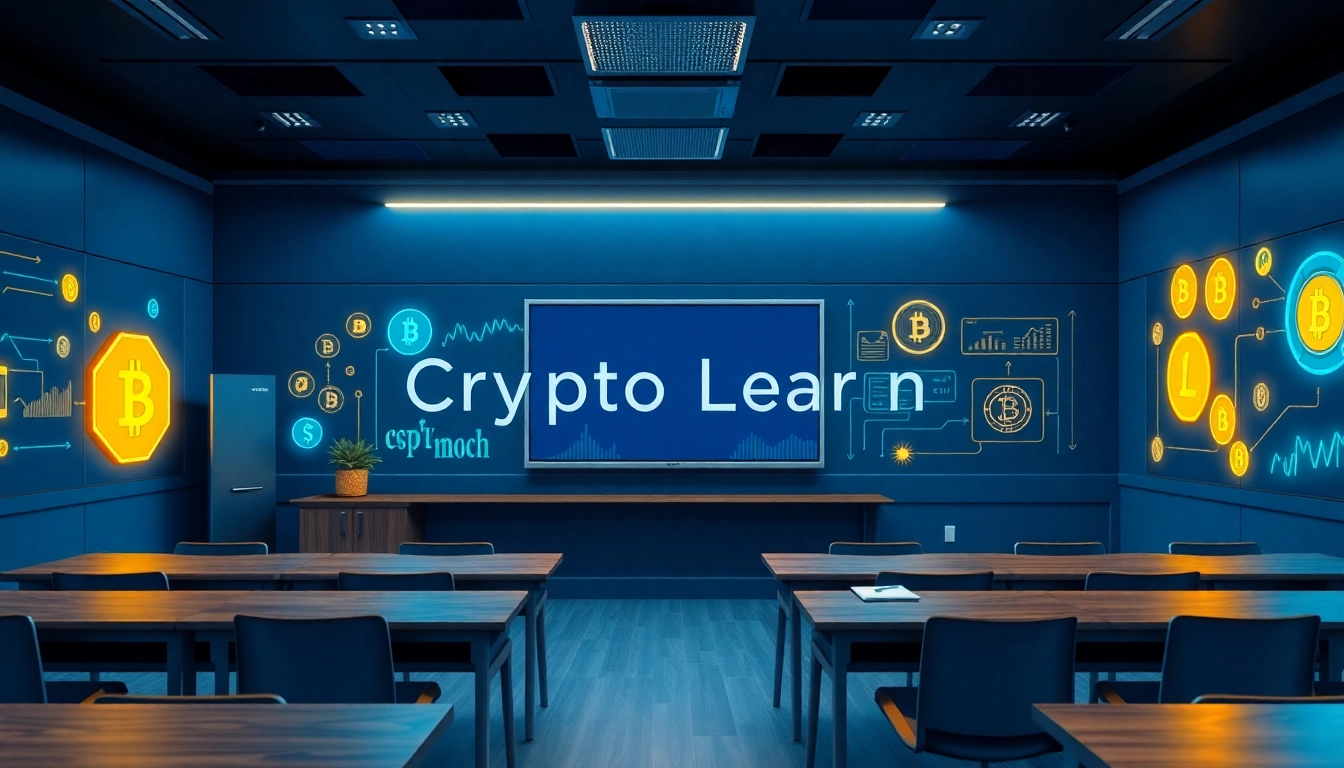Understanding the Foundations of Crypto Learning
What is Cryptocurrency? An Introduction for Beginners
Cryptocurrency, often abbreviated as crypto, is a digital or virtual form of currency that employs cryptography for secure financial transactions. Unlike traditional fiat currencies issued by governments, cryptocurrencies operate on decentralized networks powered by blockchain technology. The most well-known example is Bitcoin, launched in 2009, which revolutionized the financial landscape by introducing peer-to-peer digital cash.
crypto learning begins by understanding these fundamental concepts—how cryptocurrencies work, their benefits, and potential risks. Cryptocurrencies are not just investment assets; they also serve as a medium for transferring value globally without intermediaries, offering faster and often cheaper transactions. To truly grasp the significance of cryptocurrencies, one must explore blockchain technology, the backbone of all digital currencies.
Key Blockchain Concepts Every Learner Should Know
At the core of crypto learning is understanding blockchain—an immutable, distributed ledger that records all transactions across a network of computers. Key concepts include:
- Blocks and Chains: Data is stored in blocks, which are linked together sequentially, forming a chain that is resistant to modification.
- Decentralization: Unlike centralized databases, distributed ledgers are maintained by consensus among network participants, enhancing security and transparency.
- Consensus Mechanisms: Protocols like Proof of Work (PoW) and Proof of Stake (PoS) ensure agreement on the recorded data, crucial for network integrity.
- Smart Contracts: Self-executing contracts with terms directly written into code, enabling automation in various use cases beyond simple transactions.
Mastery of these concepts allows crypto learners to understand how platforms like Ethereum facilitate decentralized applications, fostering innovation in finance, supply chain, and more.
Core Components of Crypto Education
A solid foundation in crypto learning comprises familiarization with several core components:
- Understanding Digital Wallets: Tools for securely storing private keys and managing crypto assets.
- Knowledge of Exchanges: Platforms like Binance, Coinbase, and Kraken facilitate buying, selling, and trading cryptocurrencies.
- Security Best Practices: Recognizing phishing risks, implementing two-factor authentication, and safeguarding private keys are vital components.
- Legal and Regulatory Awareness: Staying informed about laws like the recent MiCA licensing by Gemini or regulatory debates in the US and Europe is essential for compliant and informed participation.
Effective Methods for Enhancing Your Crypto Learning Journey
Utilizing Online Courses and Interactive Platforms
The abundance of online courses from platforms like Coursera, Udemy, and Binance Academy provides accessible pathways into crypto education. These courses range from beginner introductions to advanced blockchain development and DeFi strategies. Interactive platforms often include quizzes, assignments, and community engagements that reinforce learning. For example, courses on blockchain technology can help demystify complex topics like consensus mechanisms and tokenomics.
Leveraging Tutorials, Webinars, and Educational Resources
Continuous engagement with expert-led webinars and tutorials helps learners stay updated with rapid industry changes. Websites such as LearnCrypto and Kraken offer beginner-friendly videos explaining concepts like crypto wallets, trading strategies, and blockchain security. Additionally, following reputable blogs and social media accounts of industry leaders provides insights into emerging trends like DeFi innovations or regulatory developments like the recent Fed endorsement of DeFi or CFTC’s ongoing initiatives.
Practicing with Simulated Trading and Digital Wallets
Practical experience is indispensable in crypto learning. Using demo accounts on exchanges like Binance or Coinbase Pro allows beginners to familiarize themselves with trading platforms without risking real money. Setting up and securing digital wallets—hot wallets for convenience and cold wallets for security—helps learners understand asset management. This hands-on approach bridges the gap between theory and real-world application, essential for developing confidence and competence.
Overcoming Common Challenges in Crypto Learning
Avoiding Information Overload and Misinformation
The fast-paced evolution of crypto often results in an overwhelming influx of information. To combat this, learners should focus on reputable sources such as Coinbase’s comprehensive crypto basics or Binance Academy. Cross-referencing news from trusted outlets helps prevent exposure to scams or misleading claims. Setting clear learning objectives and pacing content consumption ensures steady progress without burnout.
Staying Updated with Rapid Industry Changes
Industry developments such as Gemini’s recent MiCA license acquisition, or the US Federal Reserve’s public endorsements of DeFi, highlight the importance of consistent industry monitoring. Subscribing to newsletters, following official regulatory body announcements, and engaging with active community forums like Reddit’s r/CryptoMarkets provide continuous updates. Using tools like RSS feeds or news aggregators can streamline this process.
Building Practical Skills Alongside Theoretical Knowledge
Theoretical understanding must be complemented by hands-on skills such as executing mock trades, deploying smart contracts, or managing digital assets securely. Participating in community challenges, hackathons, and simulated trading competitions fosters practical proficiency. Such activities also help in recognizing common pitfalls like loss of private keys or misinterpreting market signals.
Advanced Strategies for Deepening Your Crypto Knowledge
Engaging with Community Forums and Expert Networks
Networking within community forums like Reddit, Telegram groups, and Discord channels unlocks real-world insights and peer support. Informed engagement with industry experts helps clarify ambiguous concepts, share successful investment strategies, and stay ahead of emerging trends like the CFTC’s new crypto sprint initiatives, or new DeFi platforms. Building relationships with thought leaders fosters continuous learning.
Following Regulatory Developments and Market Trends
Regulatory environments profoundly influence crypto markets. Recent updates, such as Gemini’s MiCA license or discussions at the Federal Reserve on DeFi adoption, underscore the importance of tracking policy changes. Regulatory literacy reduces risk and guides smarter investment decisions. Regularly reviewing official statements and participating in webinars about evolving laws are effective practices.
Implementing Crypto Learning into Real-world Investments
Practical application cements learning. This involves developing diversified portfolios, applying risk management techniques, and leveraging advanced tools like portfolio trackers. Gradually transitioning from demo trading to real trades with small amounts helps manage risk while enhancing confidence. Maintaining a learning journal to record strategies, outcomes, and lessons accelerates mastery.
Measuring Progress and Achieving Crypto Learning Success
Tracking Knowledge Gains with Quizzes and Certifications
Utilizing online quizzes, certification courses from platforms like Coursera, or industry certifications (e.g., Certified Cryptocurrency Expert) offers measurable benchmarks. Achieving such milestones indicates a solid grasp of core concepts and readiness for advanced topics.
Applying Skills to Manage Crypto Portfolios
Applying acquired knowledge to manage a live or simulated portfolio provides practical feedback. Regular portfolio reviews, rebalancing strategies, and monitoring performance metrics help refine decision-making processes. This iterative learning approach develops a nuanced understanding of market dynamics and personal risk tolerance.
Continuous Learning Through Updated Content and Resources
The crypto industry is inherently dynamic. Staying informed through reputable sources, attending industry conferences, and participating in ongoing education ensure sustained growth. Organizations often publish updated guides and case studies; for example, following recent regulatory updates or technological innovations like Zero-Knowledge Proofs reinforces current knowledge.



